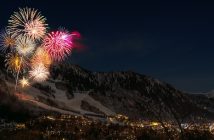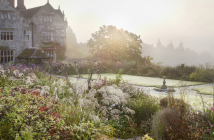“Where’s the bowl??? I’m going to be sick!!!
“He needs the bowl!” I called over my shoulder.
“Here’s the bowl!” Barked a disembodied voice as my wife stuck it through, between the seats.
I grabbed it with one hand whilst steering with the other and thrust it under the rapidly bowing head of my six-year-old who was strapped into a child’s seat next to me. Just as it slid into place, he opened his mouth and chundered breakfast, lunch and last night’s supper into the plastic opening of the pound shop receptacle. I manoeuvred through the dawdling traffic searching desperately for a suitable place to pull over.
“Phwwwarrr!!!
There he goes again.
“Wwwarrrr!!!
And again.
One eye on him and one on the road. I managed to turn down a leafy side road and pulled up in front of a closed garage which announced that it specialised in French and German vehicles. In the interim William had brought his chunderings up to six. I looked over at him with pride. Not a single drop spilled.
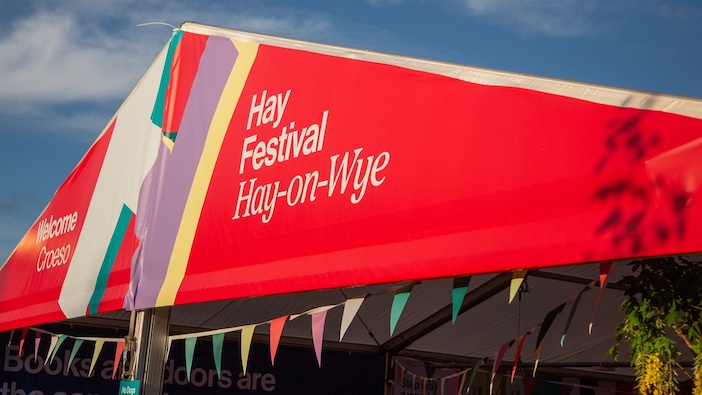
“Here,” he murmured, handing me the bowl.
“Er, thanks,” I replied.
His face was the colour of play dough.
To be honest, this wasn’t exactly how I’d imagined I’d be arriving in Hay-on-Wye to cover the world renowned literary festival. We’d left our home in East London in our DIY camper van (which wouldn’t top more than sixty on a good road) at eleven am. It was now seven in the evening. We had stopped for lunch by a field crawling with metal detectorists and thereafter the roads became increasingly drunken, as Chesterton would have put it. Our first vomit stop was at four o’clock. Now, at least the sun had come out as we drove the five remaining miles to our little campsite high on a hill in deepest Powys.
This wasn’t my first visit to Hay. That would have been more than fifteen years ago on the metaphorical eve of my brother’s wedding where I organised an overnight canoe trip on the Wye (that did not, fortunately, play out the scene from Deliverance.) It was, however, my first trip to the festival. It was, I confess, nothing like I had imagined. I had pictured stalls in the town square, streets draped in bunting and talks in the village hall. All of which it may have resembled until 2005 when it was moved to a field about a mile out.
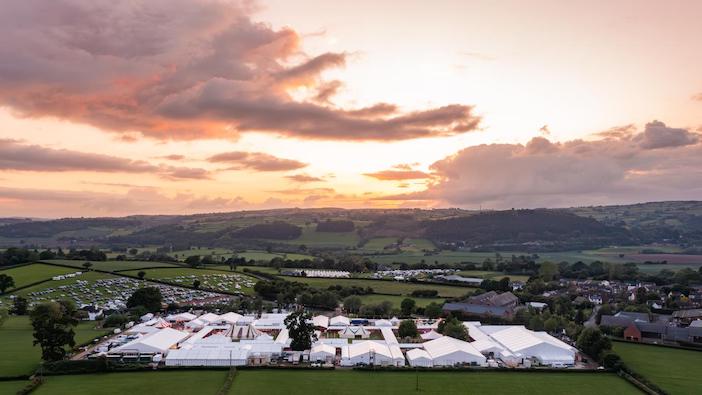
It is now a slick, professional affair with clusters of marquees connected by a rectangular covered walkway raised on red carpeted duck boards. This was convenient but vaguely disappointing, and after six hours of concerted milling on the first day, rather claustrophobic. Luckily, the town, with its independent shops and heritage stone buildings, is only a stroll away. Then there is the river and the wonderful meadows of The Warren (but more of that later.)
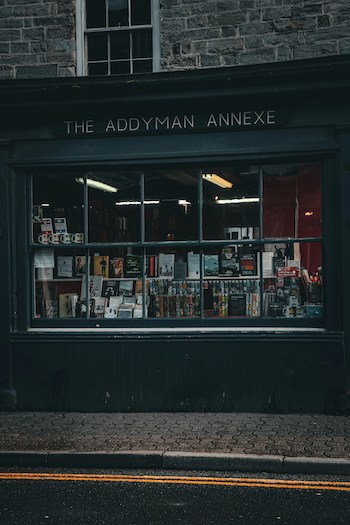
Hay-on-Wye (Photo by Yukon Haughton, courtesy of Unsplash)
The other thing to note about the festival is that it is popular. Very popular. So, book well in advance. I arrived as a greenhorn ignoramus and it was only the magic of the press pass that enabled me to squeeze into events already bursting at the seams. Many though, were irredeemably sold out. The tented field is free to enter but almost all events – from talks to panel discussions and activities – have to be booked and paid for in advance. These range in price from five or six pounds to about twenty, so if you are planning to pack it in then the costs can quickly rack up. As someone who has gone from virgin to yeoman in one season, my advice would be to mix it up – a bit of festival, a bit of town, a bit of rural idyll. The truth is, Hay, during the festival, has it all, so why not sup from the broad spread of its cornucopia?
What surprised me was that even in the embrace of the festival there is such variety. Yes, the core is books and authors covering a whole range of subjects – politics, feminism, memoir, travel, ecology – and catering for every age, from impressionable toddler, lugubrious youth, intemperate mid-life to sprightly dowager. And did I mention the books? In the festival field itself there is a shop selling new books and a shop selling second-hand books. You can join a queue and get a book signed by one of your favourite authors (who will have just delivered a scintillating address.) And if that wasn’t enough (and for some it clearly isn’t) you can wander into town and take your pick at the more than two dozen bookstores.
And it’s not just the books (have I said that already?) There is music (national treasure Jules Holland and guests played a belter one night; there is folk, jazz and classical, too), ecological walks, supervised wild swimming dips in the Wye, tours of the castle, activities for the kids including crafts and fencing (“a palpable hit William!”) and for those with more mindfulness to spare than my wife or I, 8am yoga sessions in the appropriately named Meadow Stage. But perhaps the festival’s greatest boon is the opportunity, through the sheer variety, of stepping into a world one might not have ordinarily stepped into, which arguably is one of the greatest gifts of books.
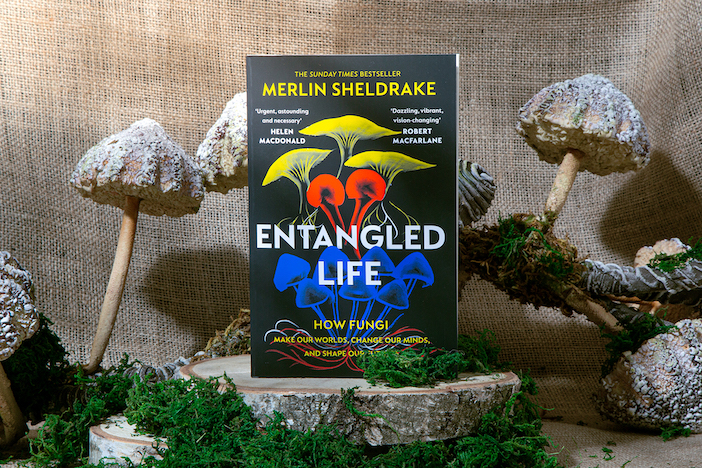
My first event foray was to see the wonderfully named Merlin Sheldrake who, with his tight, tumbling Tom Baker curls, melodious voice and charismatic presence, had something of the high druid about him. He is a biologist and avowed fungi fancier who was elaborating on the humble mushroom by way of his book, Entangled Life. I confess to being a bit of a forager myself with the distinction that I have not yet poisoned myself (or anyone else) yet what Mr Sheldrake had to say had even me slack jawed. That there is a tropical fungus that has developed the ability to target and infect a species of jungle ant, taking it over like a zombie and causing it to march upwards on a vine. When it gets to a good height it bites into a leaf in a death grip from where its head sprouts antlers, sporing the expanse of ground below. There are fungi of extraordinary complexity that will fit ten times onto a pin head, to those with subterranean mycelium networks that stretch several kilometres. Fungi, which uses a complex keg of chemicals to survive, often in symbiosis with plants, were only recognised as a separate kingdom in the late ‘60s. They remain comparatively unstudied and what they might teach us for our own survival can only be guessed at.
From the sublime to the equally sublime – if at the other end of sublimity: Jonny Flynn and Robert Macfarlane in concert. On the one hand an odd pairing, combining musician Jonny Flynn with non-musician Robert Macfarlane, but one which works because the story-telling sensibilities of both are so aligned. Their album, The Moon Also Rises, is a dream-like journey into the ancient folk wild places of Britain, through forests and across seas into the underworld of our ancestors. Both seated on the stage like mariners some decades off being ancient, nature writer Robert Macfarlane would lead you into each song with words narrative and poetic.
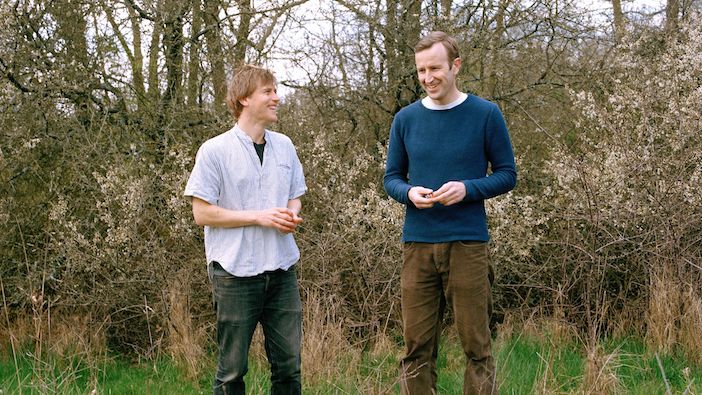
Johnny Flynn and Robert Macfarlane (Photo by Hanna -Katrina Jedrosz, courtesy of Hay Festival)
I found it hard to follow sometimes; they would drift along like a stream and wash over you. Some words and phrases you would hear and understand, others you would just feel. Macfarlane was a good orator, but the magic would start when Flynn erupted in play. His voice was rich and cracked and would span many octaves from a deep cave rumble to a gaucho’s yelp. He played an electric guitar with such verve and skill that it seemed a whole troupe was with him. The music itself spanned multiple genres – rock, blues, folk, country. He was electrifying and it was a shame we were all glued to our seats as it was music to move to. I’m sure creatively this was collaboration in the truest sense but in performance this was Jonny’s show. He was king and it was his charisma the audience responded to.
Harry’s tales from the Hay Festival 2024 concludes tomorrow…
Additional photos courtesy of Hay Festival


